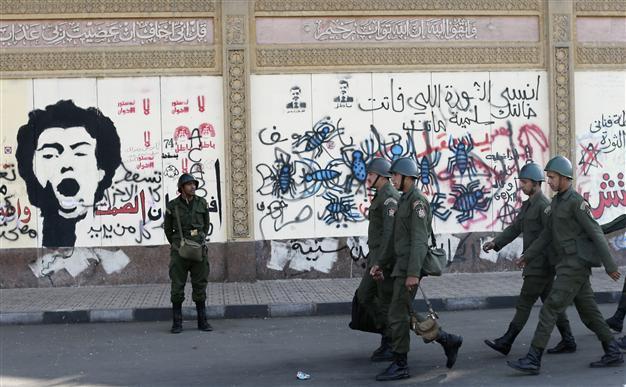Egypt's streets reflect divisions over referendum
CAIRO - Agence France-Press

Soldiers walk past a wall painted with graffiti and Arabic that reads, right, "forget the past revolution," in front of the presidential Palace in Cairo, Egypt, Thursday, Dec. 13, 2012. AP photo
A weekend referendum on a draft constitution called by President Mohamed Morsi is dividing Egypt, with many people swayed by their support or animosity for Morsi's Muslim Brotherhood.Hamdi Imam, a Cairo bookseller, is a picture of composure far from the anger that has rocked Egypt in the past three weeks.
But the 50-year-old, sitting on the pavement off a busy main road concentrating on his crossword puzzle, is anything but oblivious of the mess the country is in.
"The constitution has blood on it, it's wrong," he says. "It shackles people. From the beginning it was clear the Muslim Brotherhood shouldn't run a country. They will destroy Egypt." Imam refuses to vote in Saturday's referendum on a new constitution, drafted by an Islamist-dominated panel and denounced by a secular-leaning opposition.
"I'm Muslim, I have a beard, I pray," he says, looking at an eclectic collection of publications ranging from a biography of John Paul II in English to an Arabic-language celebrity magazine.
"The Brotherhood is not a party of religion, they are of infidel politics." Farther down the road in bustling Dokki, a central district, a group of young and old men disagree over the Brotherhood and the constitution.
The most pious-looking of the older men says he will vote against the constitution, cautiously confident he will be in the majority. "There will be more people voting 'no,' God willing." It is 28-year-old Mohammed Hassan, dressed in Western clothing, who is the first to voice support for the Islamists.
"The Brotherhood are good," he says. "No one's given them a chance, they've only been in power for five months. (Former dictator) Hosni Mubarak was there for 30 years. People have been saying they're bad for so long that everyone automatically thinks so." Another young friend of Mohammed's goes even further. "I want the (ultra-orthodox Islamic) Salafis, not the Brotherhood. The Brotherhood do this and say that, they're wishy-washy." In a cafe on the corner, Mohammed Ibrahim Sayyid, in his 40s, smokes cigarettes and drinks tea with friends.
"I'm going to vote against the constitution because I don't like what's happening. We don't want another Afghanistan because of the Brotherhood. Egypt's a diverse country with 80 million people, there shouldn't be one ruling party.
"They're exploiting the people in the name of religion." The draft charter has raised concerns among rights activists and opposition, who say it paves the way for a strict interpretation of Islamic law and curtails women's rights and freedom of expression.
The walls outside the presidential palace -- the scene of fierce clashes between Islamist supporters and secular-leaning opponents of Morsi that left eight people dead last week -- make clear what the opposition now think of their new leader, who was elected in June.
A caricature of Morsi's head has blood dripping from the president's mouth, next to the words "Leave, sheep of the Guide," a reference to the Brotherhood's spiritual leader. Another has him as a pharaoh.
On a three-metre-high (10-foot) concrete wall erected by the army a short distance away from the palace to control the influx of demonstrators, an image of a Salafist Muslim with red eyes and a blood-soaked beard holds a burning Koran.
"The revolution continues," reads another slogan.
Activists still camp out in Tahrir Square, the centre of last year's uprising that toppled Mubarak, gathering in the evening to watching re-runs of a satirical TV show poking fun at Morsi on a big screen.
But the opposition's focus has shifted to the presidential palace farther from the centre of Cairo. The protesters' chants still demand "the fall of the regime," as against Mubarak, but with an occasional variation, "the fall of the Brotherhood." A banner during a protest on Tuesday made to look like an identity card read: "Name: Mohamed Morsi; Occupation: Hosni Mubarak." Many demonstrations have been family affairs, children having their faces painted and street vendors setting up between the tanks that now guard the palace walls, in a festive atmosphere.
But last week's deadly clashes with Islamist supporters showed just how quickly things can turn violent.
Imam puts his crossword down and picks up a notebook. "I write revolution poetry," he says, showing some of his verse.
It reads: "Egypt has split into two scripts. But I know who Egypt is. Egypt is the January revolution; not those who besiege the constitution.
















